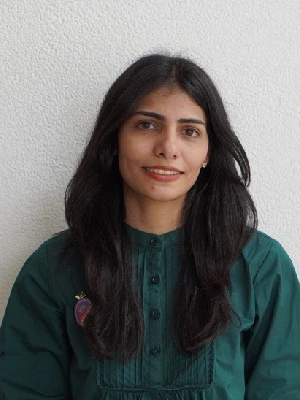Nida Mukhtar
“Shaping the Future of Pakistan’s Power Market"
Every single one of the 101 female engineers who participated in the recent WePOWER SAR100 training program have an inspiring story to tell, and Pakistan’s Nida Mukhtar is no exception.

“Shaping the Future of Pakistan’s Power Market"
Every single one of the 101 female engineers who participated in the recent WePOWER SAR100 training program have an inspiring story to tell, and Pakistan’s Nida Mukhtar is no exception.

Every single one of the 101 female engineers who participated in the recent WePOWER SAR100 training program have an inspiring story to tell, and Pakistan's Nida Mukhtar is no exception.
"When I was selected in this program, I thought I may not be able to take on the challenge, because my baby was just one month old. Still, my family encouraged me to grasp this international opportunity. I feel honored and proud of what I've achieved in this program, and for representing my country at this level."
A Deputy Manager with Pakistan's Central Power Purchasing Agency Guarantee Limited (CPPAG), Nida is passionate about shaping the future of power market systems.
She's also a champion for her own education and development.
Alongside 100 other female engineers from across Bangladesh, Bhutan, India, Maldives, Nepal, Pakistan and Sri Lanka, Nida is now the proud graduate of WePOWER SAR100, a training program delivered by the Bangkok-based Asian Institute of Technology (AIT) over 8-months in 2023-2024.
The course and its final capstone week (held in Bangkok) were made possible through the AU $32 million South Asia Regional Infrastructure Connectivity (SARIC) Program, which is funded by the Australian Government and implemented by Palladium alongside the World Bank and the International Finance Corporation.
Our journey delved deep into 10 modules, blending online classes with immersive on-site experiences. We embarked on enlightening field visits, immersing ourselves in the manufacturing process of solar panels and experiencing the future of transportation with EV buses. These hands-on experiences were invaluable, providing practical insights into the sustainable energy landscape."
In Pakistan, most of theprimary energy supply comes from oil and natural gas, with hydropower on the rise, and wind and solar PVs also slowly growing. In other words, it's a landscape with lots of room for professionals like Nida to make an impact. Thanks to SAR100, she's been able to do just that.
"From understanding the intricacies of regional power systems and renewable energy integration to exploring the nuances of power market planning and governance in the South Asian region, each module provided invaluable insights. One highlight was delving into my research on Renewable Energy Ventures: Exploring Financing Strategies, Investment Approaches, and Tariff Determination Procedures through Case Studies," Nida proudly explains.
Technical knowledge aside, SAR100 has also helped transform Nida's communication and networking skills.
"Special emphasis was placed on soft skills, fostering gender awareness and everyday leadership—a testament to the holistic approach of the program," said Nida. "This program provided a unique networking opportunity, allowing me to forge relationships with outstanding STEM ladies, united in our commitment to driving positive change in the energy sector."
Navigating the balance between work, study and personal commitments was a challenge, but for Nida, it was the ultimate reward.
"I have learnt how to handle multiple tasks and pressure, and I want to transfer my knowledge to the power sector in Pakistan. I've learnt that South Asian countries can collaborate and implement integrated power systems just like any other region. I feel accomplished, and my family does as well."
Looking to the future, if there's one final thing Nida wants to take from her SAR100 experience, it's the power of human connection.
"As I step into the SAR100 Alumni community, I'm eager to contribute positively to the Energy Sector and collaborate with fellow engineers worldwide to drive impactful change in energy transition."